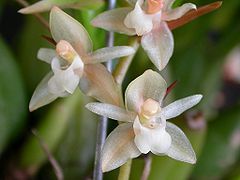Difference between revisions of "Pholidota"
| Line 10: | Line 10: | ||
The genus '''''Pholidota''''' belongs to the family [[Orchidaceae]] and the subtribe Coelogyninae. Genus that are part of this subtribe are usually terrestrial or epiphytic. There is great variation among leaf types of this genus; however, the flowers are usually small to large and appear upside down. | The genus '''''Pholidota''''' belongs to the family [[Orchidaceae]] and the subtribe Coelogyninae. Genus that are part of this subtribe are usually terrestrial or epiphytic. There is great variation among leaf types of this genus; however, the flowers are usually small to large and appear upside down. | ||
| − | + | The approximately 55 species of this genus can be found in south-east Asia, China. New Guinea, Australia and some Pacific Islands. | |
{{Inc| | {{Inc| | ||
Revision as of 10:08, 30 January 2010
If this plant info box on watering; zones; height; etc. is mostly empty you can click on the edit tab and fill in the blanks!
The genus Pholidota belongs to the family Orchidaceae and the subtribe Coelogyninae. Genus that are part of this subtribe are usually terrestrial or epiphytic. There is great variation among leaf types of this genus; however, the flowers are usually small to large and appear upside down.
The approximately 55 species of this genus can be found in south-east Asia, China. New Guinea, Australia and some Pacific Islands.
Read about Pholidota in the Standard Cyclopedia of Horticulture
|
|---|
|
Pholidota (Greek, scale and ear; the scales of the unopened raceme are said to recall the rattle of a snake). Orchidaceae. Orchids with the habit of Coe- logyne, to be grown in a warmhouse, 55° to 65°. Rhizomes creeping: pseudobulbs consisting of a single internode: fls. small, short-pedicelled, in slender racemes, each with a large bract; sepals and petals short, broad; labellum excavated or sac-like; column very short, winged around the top.—A small genus containing about 20 species, natives of India, S. China, and the Malay Archipelago. For cult., use strong light rich potting material, broken pots, old dry cow-manure, plenty of drainage. Do not allow to become very dry. CH
|
Cultivation
- Do you have cultivation info on this plant? Edit this section!
Propagation
- Do you have propagation info on this plant? Edit this section!
Pests and diseases
- Do you have pest and disease info on this plant? Edit this section!
Species
- Pholidota advena
- Pholidota aidiolepis
- Pholidota articulata
- Pholidota camelostalix
- Pholidota cantonensis
- Pholidota carnea
- Pholidota chinensis
- Pholidota clemensii
- Pholidota convallariae
- Pholidota corniculata
- Pholidota cyclopetala
- Pholidota gibbosa
- Pholidota globosa
- Pholidota guibertiae
- Pholidota imbricata
- Pholidota katakiana
- Pholidota kouytcheensis
- Pholidota leveilleana
- Pholidota longibulba
- Pholidota longilabra
- Pholidota longipes
- Pholidota mediocris
- Pholidota missionariorum
- Pholidota nervosa
- Pholidota niana
- Pholidota pachyglossa
- Pholidota pallida
- Pholidota pectinata
- Pholidota pholas
- Pholidota protracta
- Pholidota pygmaea
- Pholidota pyrranthela
- Pholidota recurva
- Pholidota roseans
- Pholidota rubra
- Pholidota rupestris
- Pholidota schweinfurthiana
- Pholidota sulcata
- Pholidota ventricosa
- Pholidota wattii
- Pholidota wenshanica
- Pholidota yunnanensis
Gallery
If you have a photo of this plant, please upload it! Plus, there may be other photos available for you to add.
References
- Standard Cyclopedia of Horticulture, by L. H. Bailey, MacMillan Co., 1963
External links
- w:Pholidota. Some of the material on this page may be from Wikipedia, under the Creative Commons license.
- Pholidota QR Code (Size 50, 100, 200, 500)

